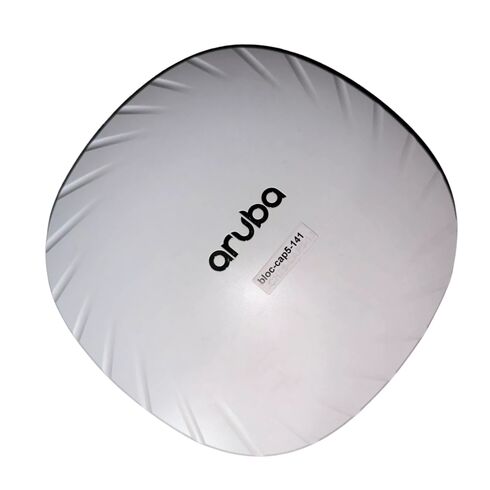HPE Aruba AP-535 JZ337A 802.11AX 4x4:4 Internal Wireless Access Point
- — Free Ground Shipping
- — Min. 6-month Replacement Warranty
- — Genuine/Authentic Products
- — Easy Return and Exchange
- — Different Payment Methods
- — Best Price
- — We Guarantee Price Matching
- — Tax-Exempt Facilities
- — 24/7 Live Chat, Phone Support
- — Visa, MasterCard, Discover, and Amex
- — JCB, Diners Club, UnionPay
- — PayPal, ACH/Bank Transfer (11% Off)
- — Apple Pay, Amazon Pay, Google Pay
- — Buy Now, Pay Later - Affirm, Afterpay
- — GOV/EDU/Institutions PO's Accepted
- — Invoices
- — Deliver Anywhere
- — Express Delivery in the USA and Worldwide
- — Ship to -APO -FPO
- — For USA - Free Ground Shipping
- — Worldwide - from $30
Same product also available in:
Product Specifications
HPE JZ337A Aruba AP-535 (US) Overview
The HPE JZ337A Aruba AP-535 is an advanced dual-band access point designed for seamless connectivity and superior performance. This external device features four internal antennas optimized for efficient wireless networking in various environments.
Networking Features
- Form Factor: External
- Connectivity Technology: Wireless
- Maximum Data Transfer Rate: 2.4 Gbps
- Supported Line Coding Formats:
- CCK
- 64 QAM
- 256 QAM
- BPSK
- QPSK
- 16 QAM
- OFDM
- 1024 QAM
- OFDMA
- Data Link Protocols:
- IEEE 802.11b
- IEEE 802.11a
- IEEE 802.11g
- IEEE 802.11n
- Zigbee
- IEEE 802.11ac
- Bluetooth 5.0
- IEEE 802.11ax
- Spread Spectrum Techniques: OFDM, DSSS
- Operating Frequency Bands: 2.4 GHz, 5 GHz
Performance Metrics
- Maximum Data Rate (2.4 GHz): 1,150 Mbps
- Maximum Data Rate (5 GHz): 2.4 Gbps
- Total Aggregate Bandwidth: 3.55 Gbps
Capacity Details
- Max Wireless Clients per Wi-Fi Radio: 1,024
- OFDMA Units: 37
- Number of BSSIDs per Radio: 16
- Status Indicators: System, Status
Advanced Features
- Trusted Platform Module (TPM)
- LACP Support
- Adaptive Radio Management (ARM)
- Maximum Ratio Combining (MRC)
- Low-Density Parity Check (LDPC)
- Transmit Beamforming (TxBF) Ready
- Direct Sequence Spread Spectrum (DSSS)
- Cyclic Delay Diversity (CDD)
- Space-Time Block Coding (STBC)
- Advanced Cellular Coexistence (ACC)
- ClientMatch Technology
- Cyclic Shift Diversity (CSD)
- APRF Technology
- MU-MIMO Technology
- Packet Aggregation (A-MPDU, A-MSDU)
- Air Monitor (AM)
- Intelligent Power Monitoring (IPM)
- Dynamic Frequency Selection (DFS)
- Secure Core Technology (SCT)
- High-Throughput (HT) Support
- Energy-Efficient Ethernet (EEE)
- Orthogonal Frequency Division Multiplexing (OFDM)
- Aruba AirMatch
- Spectrum Analyzer
- High Efficiency (HE) Support
- Target Wait Time (TWT)
Encryption and Compliance
- Encryption Protocols: WPA, WPA2, WPA3
- Compliant Standards:
- IEEE 802.11b
- IEEE 802.11a
- IEEE 802.3af
- IEEE 802.11g
- IEEE 802.11n
- IEEE 802.3at
- IEEE 802.11ac
- IEEE 802.3bz
- IEEE 802.3bt
- IEEE 802.11ax
Antenna Specifications
- Antenna Type: Internal
- Number of Antennas: 4
- Antenna Directivity: Omni-directional
- Gain Level: 5.4 dBi
Internet of Things (IoT) Compatibility
- IoT Compatible: Yes
- Communications Technologies: Bluetooth, Zigbee
Expansion and Connectivity Options
Interfaces
- 1 x HPE Smart Rate - RJ-45
- 1 x 5GBASE-T - RJ-45
- 1 x USB 2.0 - Type A
- 1 x Console - Micro-USB
Standard: 802.11AX
What is 802.11AX?
Introduction to the next generation of Wi-Fi
The HPE Aruba AP-535 Internal Wireless Access Point is equipped with the latest wireless standard, 802.11AX. Also known as Wi-Fi 6, this technology represents a significant advancement in wireless networking capabilities. It builds upon the foundation set by its predecessor, 802.11AC, to offer improved performance, enhanced efficiency, and a more reliable wireless experience.
Increased capacity and efficiency
One of the key benefits of 802.11AX is its ability to handle higher capacity and support more devices simultaneously. With the proliferation of smart devices and the increasing demand for bandwidth-intensive applications, such as video streaming and online gaming, traditional Wi-Fi standards struggled to keep up. However, with 802.11AX, users can enjoy smoother connections and faster speeds even in congested environments.
This standard achieves better efficiency through a technology called Orthogonal Frequency Division Multiple Access (OFDMA). It allows the access point to divide the available spectrum into smaller sub-channels, enabling multiple devices to transmit and receive data simultaneously. This means that even in crowded areas where multiple devices are competing for network resources, each device can still maintain a reliable connection and experience minimal latency.
Improved performance and speed
802.11AX also introduces another groundbreaking technology called Multi-User Multiple Input Multiple Output (MU-MIMO). Unlike its predecessor, which only supported downlink MU-MIMO, 802.11AX enables both uplink and downlink MU-MIMO. This means that the access point can communicate with multiple devices simultaneously, significantly increasing overall network throughput.
Additionally, 802.11AX supports higher data rates with its enhanced modulation scheme known as 1024-QAM. This modulation technique allows for more data to be encoded and transmitted within the same wireless channel, resulting in faster connection speeds and improved overall performance.
Better battery life for devices
Another advantage of 802.11AX is its ability to prolong the battery life of devices connected to the network. This is achieved through a feature called Target Wake Time (TWT). TWT allows devices to schedule specific time intervals for transmitting and receiving data, reducing the amount of time they need to keep their wireless radios active. As a result, devices can conserve energy and extend their battery life, making 802.11AX particularly beneficial for battery-powered IoT devices and smartphones.
The importance of 802.11AX for users
With the proliferation of bandwidth-hungry applications and the increasing number of connected devices, having a reliable and efficient wireless network is crucial. The 802.11AX standard addresses these challenges by offering increased capacity, improved efficiency, higher performance, and better battery life for devices.
For businesses, this means that they can provide a seamless wireless experience to their employees and customers, even in high-density environments such as office buildings, conference centers, or stadiums. The ability to support a large number of devices simultaneously without sacrificing performance ensures that everyone can stay connected and productive.
In educational institutions, 802.11AX enables teachers to leverage technology in the classroom without worrying about network congestion or slow speeds. Students can access online resources, collaborate on projects, and participate in virtual learning activities without interruptions.
For home users, 802.11AX ensures that everyone in the household can enjoy smooth streaming of 4K videos, online gaming, and video calls without experiencing lag or buffering issues. It also future-proofs the network for upcoming technologies and devices that will rely on faster and more reliable wireless connections.
In summary, the 802.11AX standard offered by the HPE Aruba AP-535 Internal Wireless Access Point brings numerous benefits to users, including increased capacity, improved efficiency, better performance, and extended battery life. It is a crucial feature for users who require a robust and future-proof wireless network that can handle the demands of today's digital world.
Antennas: 4x4:4
What is 4x4:4?
Understanding antenna configurations
The HPE Aruba AP-535 Internal Wireless Access Point features a 4x4:4 antenna configuration. This specification refers to the number of transmit and receive antennas available on the access point.
In a 4x4:4 configuration, there are four transmit antennas and four receive antennas, allowing for a total of four spatial streams. This means that the access point can simultaneously transmit and receive data on four separate channels, providing higher data throughput and improved overall performance.
Increased coverage and range
One of the primary benefits of a 4x4:4 antenna configuration is its ability to provide extended coverage and range. The additional antennas allow for a more robust signal, reducing the likelihood of dead zones or weak signal areas within the coverage area.
With expanded coverage, users can enjoy reliable connectivity throughout their premises, whether it's an office building, warehouse, or large home. This is especially important in environments where maintaining a consistent wireless connection is crucial for productivity or user experience.
Better signal quality and reliability
The use of multiple antennas in a 4x4:4 configuration also improves signal quality and reliability. By leveraging advanced techniques such as beamforming, the access point can focus its signal towards specific devices, enhancing signal strength and reducing interference.
Beamforming technology directs wireless signals in the direction of the intended recipient, rather than broadcasting them in all directions. This targeted approach minimizes signal degradation and ensures that devices receive a strong and reliable signal, even in challenging environments with obstacles or interference.
Enhanced network capacity
Another advantage of a 4x4:4 antenna configuration is its ability to support higher network capacity. With four spatial streams, the access point can handle more concurrent connections and transmit more data simultaneously.
This increased network capacity is especially beneficial in high-density environments where multiple devices are competing for limited network resources. Whether it's a crowded office space, a conference center, or a public venue, the 4x4:4 configuration can accommodate a larger number of devices without sacrificing performance or causing network congestion.
The importance of 4x4:4 for users
The 4x4:4 antenna configuration offered by the HPE Aruba AP-535 Internal Wireless Access Point delivers several important benefits to users. These include increased coverage and range, improved signal quality and reliability, and enhanced network capacity.
For businesses, the extended coverage and range provided by a 4x4:4 configuration ensure that employees can stay connected and productive throughout the premises. Whether they are in their offices, meeting rooms, or common areas, they can rely on a strong and consistent wireless connection to access critical resources and collaborate effectively.
In larger homes or multi-story buildings, the 4x4:4 configuration eliminates dead zones and ensures that users can enjoy seamless connectivity from any location within their property. Streaming high-definition videos, playing online games, or video conferencing becomes hassle-free without interruptions or signal dropouts.
Additionally, the improved signal quality and reliability offered by a 4x4:4 configuration are particularly beneficial for applications that require stable and low-latency connections. This includes voice-over-IP (VoIP) calls, video conferencing, and real-time data transfers. Users can rely on a strong and consistent signal, minimizing disruptions and ensuring a smooth user experience.
In summary, the 4x4:4 antenna configuration of the HPE Aruba AP-535 Internal Wireless Access Point provides users with increased coverage, improved signal quality, and enhanced network capacity. It is an essential feature for users who require reliable and high-performance wireless connectivity in their homes or businesses.













